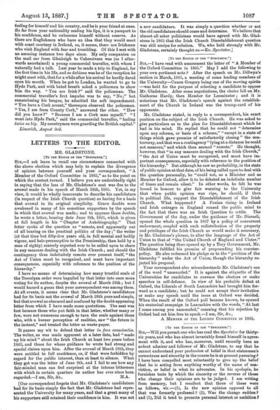[To THE EDITOR OF THE " SPECTATOR:1
Sea,—I have read with amazement the letter of "A Member of the Oxford Committee in 1865." May I add the following to your own pertinent note ? After the speech on Mr. Dillwyn's motion in March, 1865, a meeting of some leading members of the University—Canon Gregory being one of the moving spirits —was held for the purpose of selecting a candidate to oppose Mr. Gladstone. After some negotiations, the choice fell on Mr. Gathorne Hardy, then Member for Leominster; and it is notorious that Mr. Gladstone's speech against the establish- ment of the Church in Ireland was the trump-card of his opponents.
Mr. Gladstone stated, in reply to a correspondent, his exact position on the subject of the Irish Church. He was asked to give particulars as to the plan for Disestablishment which he had in his mind. He replied that he could not "determine upon any scheme, or basis of a scheme," "except in a state of things which gave promise of satisfactorily closing" the con- troversy, and that was a contingency "lying at a distance be °mid not measure," and which then seemed "remote." He thought, however, that "in any measure dealing with the Irish Church," "the Act of Union must be recognised, and must have im- portant consequences, especially with reference to the position of the hierarchy." Bat although he saw no probability, in the state of public opinion at that date, of his being called upon to deal with the question personally, he "could not, as a Minister and as Member for Oxford, allow it to be debated an indefinite number of times and remain silent." In other words, he felt he was bound in honour to give fair warning to the University that when public opinion was ripe, he should, if then in political life, support the Disestablishment of the Irish Church. What happened P A Fenian rising in Ireland and Irish outrages in England roused the public mind to the fact that there was an Irish Question to settle. The Government of the day, under the guidance of Mr. Disraeli, opened the whole question in 1867 by a policy of concurrent endowment, coupled with such redistribution of the property and privileges of the Irish Church as would make it necessary, in Mr. Gladstone's phrase, to alter the language of the Act of Union to that of "the United Church of England and Ulster." The question being thus opened up by a Tory Government, Mr. Gladstone fulfilled his promise of propounding his counter. policy. He also redeemed his pledge as to the "position of the hierarchy" under the Act of Union, though the hierarchy re- jected his proposal.
Your correspondent also misunderstands Mr. Gladstone's use of the word " nnmuzzled." It is against the etiquette of the Universities for candidates to canvass the electors or make speeches in self-defence. In view of his probable defeat at Oxford, the Liberals of South Lancashire had brought him for- ward as a candidate ; but he could not accept their invitation or make any speech until the issue at Oxford was decided. When the result of the Oxford poll became known, he opened his oratorical campaign in Lancashire with the words, "At last I come among you unmuzzled," meaning that his rejection by Oxford had set him free to speak.—I am, Sir, &c., A MEMBER OF THE LONDON COMMITTEE 17i 1865.


































 Previous page
Previous page